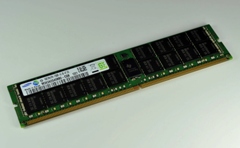
Samsung Electronics avvicina la tecnologia all'era DDR4 (Double Data Rate di quarta generazione) annunciando l'inizio, a benificio dei produttori di cpu e controller, della fase di sampling dei primi moduli RDIMM (Registered Dual Inline Memory Module) al mondo di tipo DDR4 aventi una capacità pari a 8GB (gigabyte) o 16GB (gigabyte).
Come tipicamente accade con tutti i moduli RDIMM, anche quelli annunciati dal gigante coreano sono finalizzati all'equipaggiamento dei server orientati al mercato enterprise; essi, più in dettaglio, seguono temporalmente le varianti iniziali da 2GB, annunciate da Samsung nel dicembre del 2010, e ne condividono la tecnologia di fabbricazione.
I nuovi moduli di DDR4 da 16GB e 8GB di Samsung sono realizzati con un processo di fabbricazione a 30nm; essi possono vantare non soltanto prestazioni superiori a quelle delle attuali soluzioni DDR3 (l'obiettivo dichiarato di Samsung è assicurare una banda passante pari al doppio del valore attuale, che è di 1600Mbps, ndr) ma anche un consumo di potenza notevolmente ridotto, ove si consideri che la tensione di polarizzazione è pari a 1.2V (mentre quella delle DDR3 a 1.35V).

[Immagine ad alta risoluzione]

Samsung Electronics Co., Ltd., the world leader in advanced memory technology, today announced that it has begun sampling the industry's first 16-gigabyte (GB) double data rate-4 (DDR4), registered dual inline memory modules (RDIMMs), designed for use in enterprise server systems.
"By launching these new high-density DDR4 modules, Samsung is embracing closer technical cooperation with key CPU and server companies for development of next-generation green IT systems," said Wanhoon Hong, executive vice president, memory sales & marketing, Samsung Electronics. "Samsung will also aggressively move to establish the premium memory market for advanced applications including enterprise server systems and maintain the competitive edge for Samsung Green Memory products, while working on providing 20 nanometer (nm) class based DDR4 DRAM in the future."
Using 30 nm-class process technology, Samsung sampled new 8 GB and 16 GB DDR4 modules in June, in addition to providing them to major CPU and controller makers. The modules will bring the highest density and performance levels to premium enterprise server systems. Samsung previously introduced the industry's first 30 nm-class 2 GB DDR4 module in December, 2010.
Employing new circuit architecture for computing systems, DDR4 technology boasts the highest performance among memory products available for today's computing systems, which by next year will reach twice the current 1,600 megabits per second (Mbps) of DDR3 based modules. Also, by processing data far more efficiently at a mere 1.2 volts, Samsung's DDR4 modules will reduce power consumption by approximately 40 percent compared to its predecessor DDR3 modules operating at 1.35V.
Samsung will keep working on completion of the JEDEC (Joint Electron Device Engineering Council) standardization of DDR4 technologies and product specifications, which is expected to be accomplished by August.
The company said it will work closely with its customers including server OEMs, as well as CPU and controller makers, to expand the market base for high-density DDR4 modules, of which it plans to begin volume production next year. It also is set to expand the overall premium memory market with its most advanced 20 nm-class based DDR4 DRAM products, which will be available sometime next year at densities up to 32 GB.
Samsung has been leading the advancement of DRAM technology ever since it developed the industry's first DDR DRAM in 1997. In 2001, it introduced the first DDR2 DRAM, and in 2005, announced the first DDR3 using 80 nm-class technology.
Source: Samsung Electronics Press Release
Links



